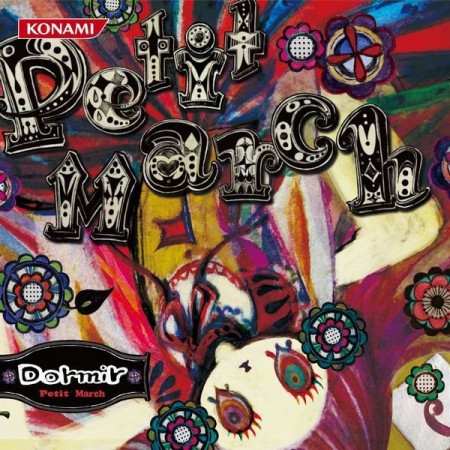Petit March
 |
Album Title: Petit March |
| Record Label: Konami Digital Entertainment |
|
| Catalog No.: LC-2092 |
|
| Release Date: February 15, 2012 |
|
| Purchase: Buy at CDJapan |
Overview
Petit March is the first album by Tomosuke Funaki under his Dormir alias with vocalist crimm. Each track has a bright palette, often with a mix of electronic and band instruments, and various influences from jazz to folk and pop. The vocals from crimm help invoke childlike imagery, and though many of the tracks are somewhat childish in aesthetic there is a maturity to be found in this album, from the unique and complex arrangements to the wonderful performances and occasionally wistful melodies.
Body
The album starts with the newly penned “Introduction”, which begins with some improv piano before bringing the rest of the instruments. Where the piano had an air of maturity to it, the full ensemble carries the more childish sound of the Dormir alias, having with the small band xylophones and some other idiophones. crimm’s vocal is also introduced here, with her standard half-whispered style. It’s a short but nice track that works well as an introduction to the general Dormir style. The next track is “space-merry-go-round”, which has only been remastered, but not extended. It also carries that more childish air to it, being very energetic and busy with bright instruments throughout, and this is all heightened by crimm’s vocals. That said, it is far from being a simple or basic song, with a lot of surprises such as in the instrumentation (a harpsichord comes in later) and in the general structure of the song (such as the waltz bit near the end). The later “Namaiki Princess” is fairly similar, leaning more into a swing style of music with a tinge of rock (manifested particularly in the new electric guitar solo). It’s all fun stuff, although its bright style may prove a bit much for many listeners.
More accessible is “Nyandafuru-55”, a jazz track with clearer vocals and more straightforward instrumentation. It’s the same version of the track that appeared on marble, which is to say that it is an absolutely fantastic track, and is one of my favourites from both albums. It’s incredibly fun, catchy, and perfectly brassy. Then there is “Une mage blanche”, which draws more on French lounge influences (like some of the stuff under Funaki’s Orange Lounge alias), and I also like the seamless inclusion of chiptune elements here and there. It has not been rearranged, just lengthened a bit with another verse and a nice improv segment later on. “Mahou no Tamago” starts deceptively with a short piano and strings opening before moving into electropop territory, though still keeping the distinct Dormir sound. I do wish the vocals were a bit more prominent, as the melody especially shines at the reduced bridge, but feels otherwise a bit muffled. It’s still a nice fun track, however. Then there is “Cookie Bouquets”, a collaboration with L.E.D. (Toshiyuki Kakuta). Here the upbeat Dormir sound meets Kakuta’s breakcore in a surprisingly solid track, with the two sounds complimenting each other very well. It should be a chaotic mess, but it all comes together. The track is not lengthened here, with only a few minimal changes made in instrumentation which are barely noticeable. These tracks are all a lot lot of fun, and the slight alterations to the styles keeps things fresh but coherent.
A number of the tracks have throwbacks to even older styles of music. “αρχη” (arche) has a folk sound mixed into it, in addition to its harpsichord and rock sounds (even throwing in a 5/4 time signature). It all becomes a bit chaotic later on, yet Funaki manages to balance it all, although it still isn’t quite as strong as other tracks. “Ferris Wheel” is more overtly folk, being so not just in instrumentation but also in its waltzy composition. The fiddles sound great here, as does the new solo in the middle of the song. It’s a very warm and charming track, and is among my favourites on the album. “Ringo Logic” is quite similar, and has been rearranged slightly from its original. Some quirkier electronica passages lie throughout the track, keeping things interesting, though I actually prefer the straightforwardness of “Ferris Wheel”. “Mizuumi no Kioku” carries a more regal French sound, helped by the harpsichord and piano. This too has been rearranged a bit, but nothing drastic. The extension of the song allows its many different segments to come together better, feeling less scattered than the game version of the song. I love the tinge of sadness that the song carries throughout, despite having a grander sound than many of the other tracks. “Omochabako no Rondo” also has a more classical sound to it, and is a bit slower. The violin solo is wonderful on this track, having a whirling feeling, and the track is quite beautiful once it blossoms near the end.
Finally, a number of tracks are a bit more pop in composition, but they are standouts for me on the album, being the most accessible. “Hoshiyume” is a straightforward track with a pop-rock foundation. The tempo is a bit slower than with the other songs, but it allows for a great build up of sound throughout the track, sounding quite grand by the end. Not to mention it has a wonderful catchy melody, and the vocals are perfect for the track. At the tail end of the album is “Resurrection”, which is even more straightforward in arrangement, but again still very catchy. It is particularly light and bubbly in its decidedly pop sound, but it has surprising subject matter for its lyrics in the final stretch. “Sayonara Trip” is a similarly strong track, also bright and bubbly with synths. It carries though a bit of sadness with it; it’s a bittersweet departure. This long version of the song is much appreciated, since the original cut off rather abruptly. The final track is “Ending”, which is actually a remix of Funaki’s “Marigold”, with vocals now by crimm. This track is the slowest of the album, easing things out for the close. It’s also very atmospheric and space-y, actually sounding a bit like a NekomataMaster track at times. The arrangement works quite well, being a bit mysterious and alluring, and it makes me excited to see what Funaki will do next if he revisits the alias in the future. A strong close to a strong album.
Summary
Petit March is another wonderful album from Tomosuke Funaki, showcasing yet another completely different side of music that he has explored and adapted to. The album has a strong coherence with the child-like concept, but can still entertain and even move listeners of all ages, once the depth is found beneath the colourful exterior. But even without this the album is great fun with many catchy songs and playful arrangements with great performances from the various instruments. Funaki brings in enough influences from folk to pop to keep things fresh, and the extended versions of tracks don’t make them overlong or tedious. I would have been happy with a bit more new material or rearrangements for the album, but there is till plenty here for fans to enjoy. Ultimately the style might not be for everyone, but it’s hard to deny that Funaki shows some great artistry here.
Do you agree with the review and score? Let us know in the comments below!
4
Posted on November 25, 2015 by Christopher Huynh. Last modified on November 25, 2015.














